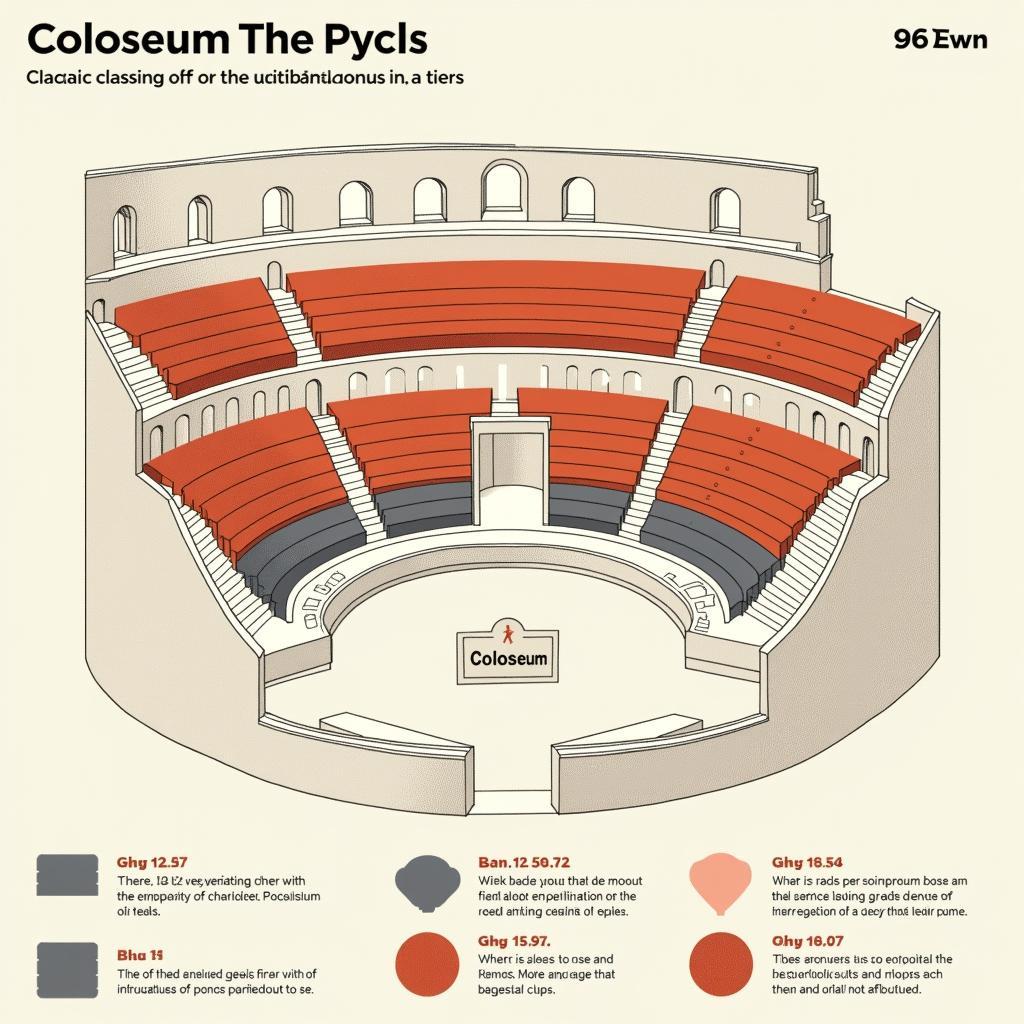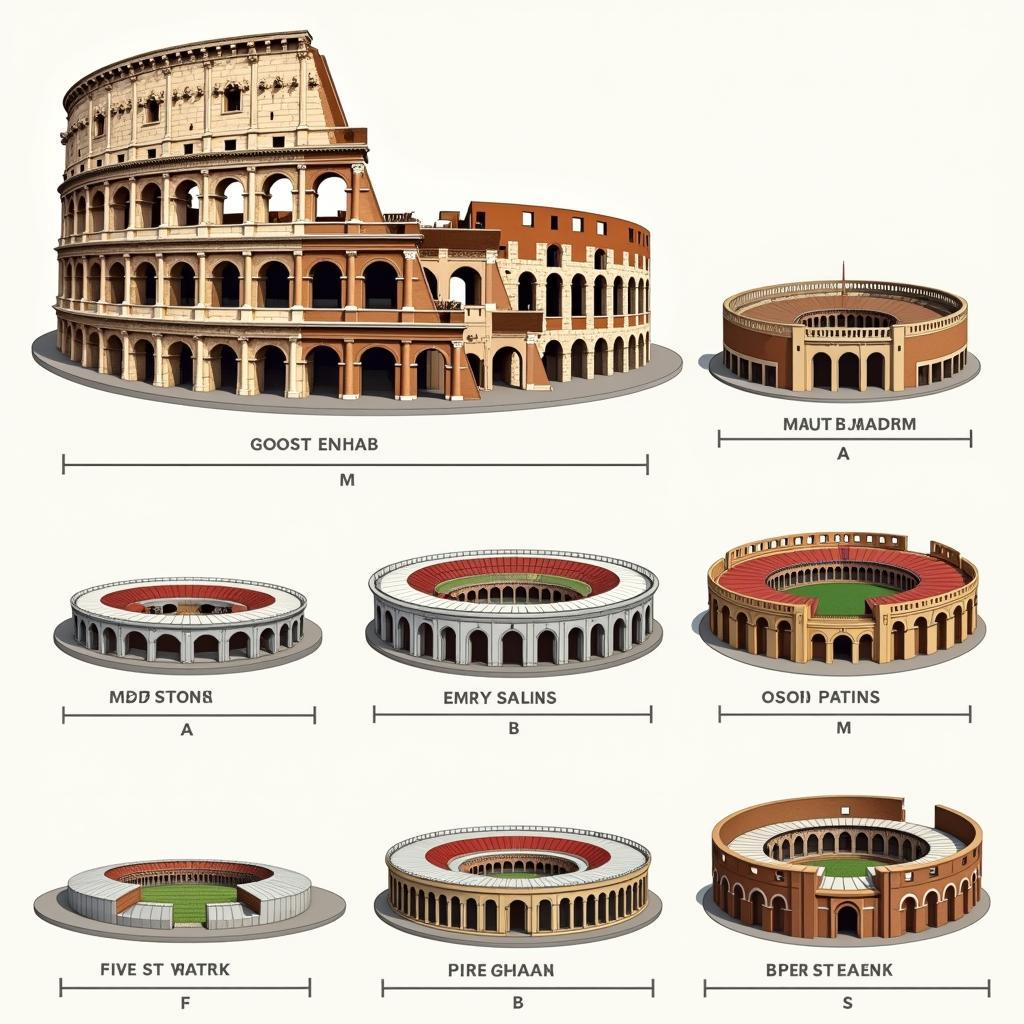Colosseum Size Chart: Understanding the Magnitude of Rome’s Icon
November 2, 2024The Colosseum, a symbol of Roman grandeur and engineering prowess, continues to captivate visitors from across the globe. Understanding its immense size through a Colosseum Size Chart helps grasp the true scale of this ancient marvel. This article will delve into the dimensions of the Colosseum, exploring its various levels and offering insights into its historical context.
Visualizing the Colosseum’s Vastness with a Colosseum Size Chart
Imagine stepping back in time to ancient Rome, surrounded by the roar of the crowd and the clash of gladiators. To truly appreciate the experience, it’s essential to grasp the sheer scale of the Colosseum. A colosseum size chart provides a visual representation of its dimensions, allowing us to comprehend the magnitude of this architectural masterpiece. These charts often depict the arena floor, the seating tiers, and the overall elliptical shape, offering a clear perspective on the Colosseum’s layout.
This size and scale allowed for thousands of spectators to witness these events, highlighting the importance of public entertainment in Roman society. It’s no wonder the Colosseum remains an iconic symbol of Roman civilization.
Exploring the Colosseum’s Dimensions: A Closer Look
The outer ellipse of the Colosseum measures approximately 189 meters long and 156 meters wide. Its height reaches around 50 meters, equivalent to a modern 12-story building. The arena floor, where the main events took place, is an impressive ellipse measuring about 86 meters long and 54 meters wide.
 Colosseum Seating Capacity and Tiers
Colosseum Seating Capacity and Tiers
These impressive dimensions allowed the Colosseum to accommodate an estimated 50,000 to 80,000 spectators. The seating was arranged in tiers, reflecting the social hierarchy of Roman society. The lower tiers were reserved for the elite, while the upper tiers accommodated the general public. This hierarchical arrangement is a fascinating reflection of Roman social structures.
Why a Colosseum Size Chart Matters: Putting History into Perspective
A colosseum size chart isn’t just a collection of numbers; it’s a key to understanding the cultural and historical significance of this iconic structure. By visualizing the Colosseum’s vastness, we can better appreciate the scale of the events that took place within its walls. From gladiatorial combats to public executions and mock sea battles, the Colosseum hosted a wide array of spectacles. Its size played a crucial role in creating a sense of awe and wonder among the spectators, reinforcing the power and grandeur of the Roman Empire.
 Colosseum Size Compared to Modern Stadiums
Colosseum Size Compared to Modern Stadiums
Examining a colosseum size chart alongside modern stadium diagrams provides a striking comparison. It reveals how the Colosseum’s capacity and scale rivaled, and in some cases, surpassed, many of today’s sporting venues.
Conclusion: The Enduring Legacy of the Colosseum
The Colosseum, through its sheer size and historical significance, continues to fascinate and inspire. A colosseum size chart offers a tangible way to connect with this ancient wonder, allowing us to appreciate its scale and understand its place in history. The Colosseum stands as a testament to Roman engineering ingenuity and serves as a lasting reminder of the empire’s influence on the world. Exploring its dimensions is a journey into the past, offering a glimpse into the lives and experiences of those who lived, worked, and entertained within its iconic walls.
FAQ
- What is the purpose of a colosseum size chart? A colosseum size chart visually represents the dimensions of the Colosseum, allowing us to grasp its immense scale.
- How many people could the Colosseum hold? The Colosseum could hold an estimated 50,000 to 80,000 spectators.
- What were the dimensions of the arena floor? The arena floor measured approximately 86 meters long and 54 meters wide.
- How tall is the Colosseum? The Colosseum stands approximately 50 meters tall.
- Where can I find a colosseum size chart? Colosseum size charts can be found online, in books, and at the Colosseum itself.
- What kinds of events took place in the Colosseum? The Colosseum hosted various events, including gladiatorial combats, public executions, and mock sea battles.
- Why is the Colosseum important? The Colosseum is an iconic symbol of Roman civilization, showcasing the empire’s engineering prowess and cultural significance.
Need more information on travel in Italy? Check out this article on bucket hat italy.
For assistance, please contact us: Phone: 0963418788, Email: [email protected] Or visit us at: 2M4H+PMH, Phường Nghĩa Thành, Gia Nghĩa, Đắk Nông, Việt Nam. We have a 24/7 customer service team.